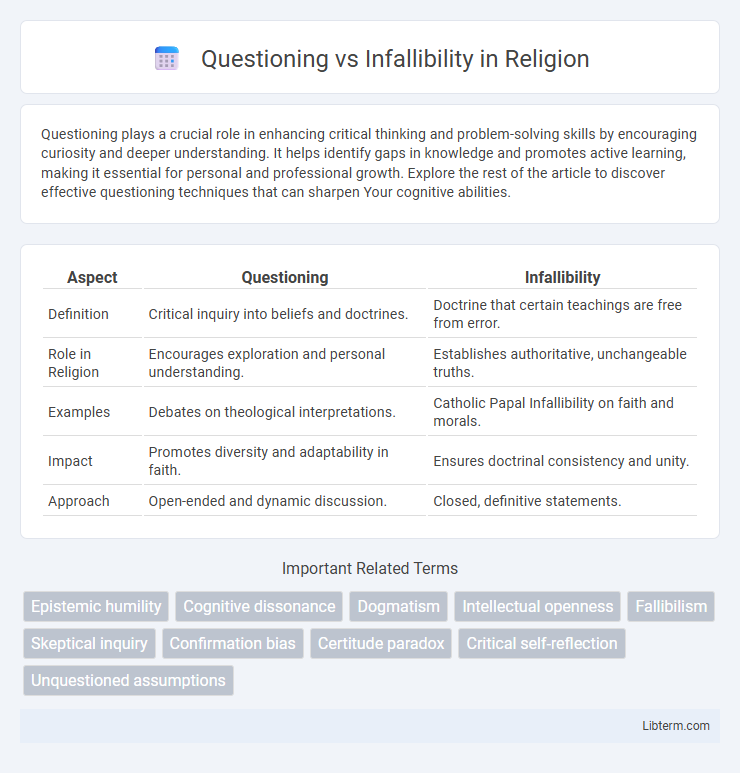Questioning plays a crucial role in enhancing critical thinking and problem-solving skills by encouraging curiosity and deeper understanding. It helps identify gaps in knowledge and promotes active learning, making it essential for personal and professional growth. Explore the rest of the article to discover effective questioning techniques that can sharpen Your cognitive abilities.
Table of Comparison
| Aspect | Questioning | Infallibility |
|---|---|---|
| Definition | Critical inquiry into beliefs and doctrines. | Doctrine that certain teachings are free from error. |
| Role in Religion | Encourages exploration and personal understanding. | Establishes authoritative, unchangeable truths. |
| Examples | Debates on theological interpretations. | Catholic Papal Infallibility on faith and morals. |
| Impact | Promotes diversity and adaptability in faith. | Ensures doctrinal consistency and unity. |
| Approach | Open-ended and dynamic discussion. | Closed, definitive statements. |
Understanding Questioning and Infallibility
Understanding questioning involves recognizing it as a fundamental cognitive process that facilitates critical thinking, learning, and intellectual growth by challenging assumptions and exploring multiple perspectives. Infallibility refers to the perceived or claimed inability to make mistakes, often attributed to authorities, doctrines, or systems, which can limit inquiry and discourage skepticism. Balancing questioning with the recognition of fallibility encourages open-mindedness and continuous refinement of knowledge.
The Roots of Infallibility in Human Behavior
The roots of infallibility in human behavior stem from cognitive biases such as confirmation bias and the need for cognitive closure, which drive individuals to resist questioning and maintain certainty. These psychological tendencies are reinforced by social and cultural structures that valorize expertise and discourage doubt. Understanding these foundations highlights the tension between the natural propensity for infallibility and the critical role of questioning in intellectual growth.
Questioning: Catalyst for Growth and Innovation
Questioning serves as a fundamental catalyst for growth and innovation by challenging existing assumptions and fostering critical thinking. It encourages exploration and the continuous search for improvement, driving breakthroughs in various fields. Embracing a mindset of inquiry opens pathways to new ideas, adaptability, and transformative discoveries.
Infallibility in Authority: Perception vs. Reality
Infallibility in authority often contrasts sharply between perception and reality, where leaders are assumed to be beyond error despite human limitations. This misconception elevates authority figures to an untouchable status, hindering critical questioning and accountability. Recognizing fallibility encourages transparency and fosters a culture of continuous improvement rather than blind acceptance.
Cognitive Bias and the Fear of Being Wrong
Cognitive bias often fuels the fear of being wrong, leading individuals to favor infallibility over questioning. Confirmation bias and the Dunning-Kruger effect intensify resistance to doubt, hindering critical thinking and growth. Embracing questioning mitigates these biases, fostering intellectual humility and more accurate decision-making.
The Role of Questioning in Critical Thinking
Questioning plays a crucial role in critical thinking by challenging assumptions and uncovering hidden biases, leading to deeper understanding and more robust conclusions. It stimulates analytical reasoning and encourages the exploration of alternative perspectives, preventing the stagnation of ideas caused by the belief in infallibility. Emphasizing inquiry over certainty fosters intellectual humility and continuous learning, essential components for effective problem-solving and decision-making.
Societal Impacts of Infallibility Mindsets
Infallibility mindsets within societies often lead to rigid belief systems that suppress critical thinking and discourage open dialogue, resulting in intellectual stagnation. Such environments foster intolerance toward dissent, which can escalate social polarization and inhibit progressive policy-making. The inability to question authority or accepted norms undermines democratic principles and impedes social innovation.
Why Embracing Questions Matters
Embracing questions fosters critical thinking and continuous learning, essential for intellectual growth and innovation. Questioning challenges assumptions and uncovers deeper insights, preventing dogmatic adherence to potentially flawed beliefs. A mindset open to inquiry promotes adaptability and resilience in complex, evolving environments.
Overcoming the Stigma of Admitting Uncertainty
Acknowledging uncertainty fosters intellectual growth and resilience by encouraging open inquiry and continuous learning, which counters the stigma of infallibility that often hinders progress. Embracing questions cultivates a culture of transparency and adaptability, essential for innovation and effective problem-solving in academic and professional settings. Cognitive flexibility, supported by psychological research, reveals that the ability to admit doubt enhances decision-making and interpersonal trust, ultimately driving collective advancement.
Cultivating a Culture of Inquiry Over Infallibility
Cultivating a culture of inquiry encourages critical thinking and continuous learning by valuing questions over unquestioned infallibility. Organizations that prioritize open dialogue and skepticism foster innovation, adaptability, and problem-solving skills. Emphasizing inquiry drives collective intelligence, whereas insisting on infallibility often stifles creativity and limits growth.
Questioning Infographic

 libterm.com
libterm.com